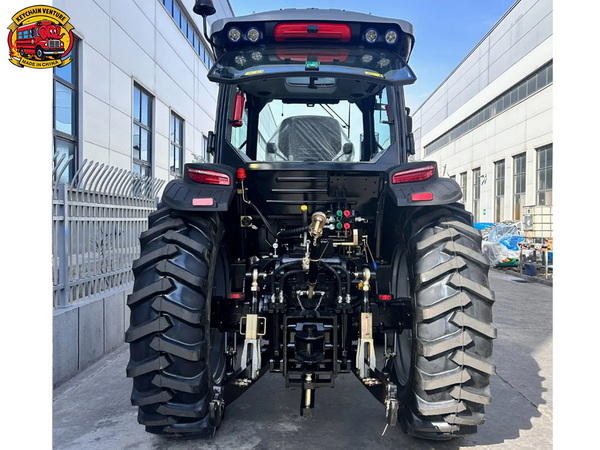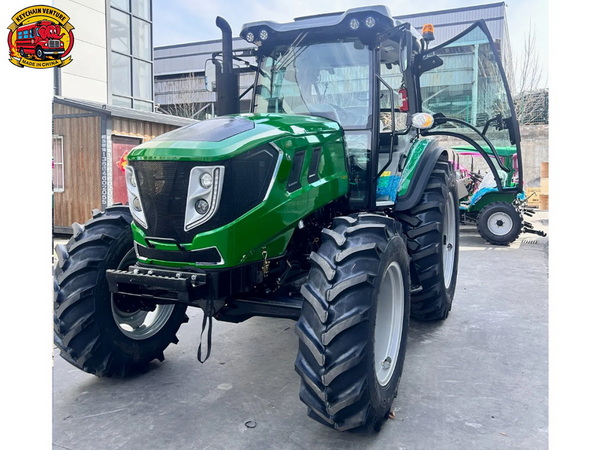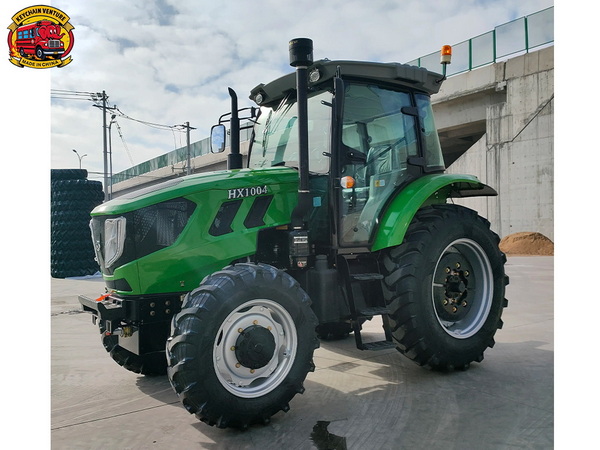Views: 222 Author: Amanda Publish Time: 2025-09-07 Origin: Site








Content Menu
● The Growing Demand for Used Tractors in Agriculture
● Why Consider Buying a Used Tractor?
● Key Considerations Before Purchasing a Used Tractor
>> 1. Purpose and Requirements
>> 2. Tractor History and Condition
>> 3. Inspection and Test Drive
>> 4. Availability of Spare Parts and Service Support
>> 5. Warranty and Seller Credentials
● Detailed Inspection Guidelines and Process
● Common Issues to Watch Out For in Used Tractors
● Financing Options for Buying Used Tractors
● Integrating a Used Tractor into Daily Farm Operations
● Essential Maintenance Tips for Longevity
● Technology and Modern Upgrades for Used Tractors
● Environmental and Economic Benefits of Buying Used Tractors
● Case Study: How a Farmer Benefited from Buying a Used Tractor
● Frequently Asked Questions (FAQ)
>> 1. How do I verify the authenticity of a used tractor's history?
>> 2. What are the typical hour ranges that indicate a used tractor's lifespan?
>> 3. How can I ensure that buying a used tractor does not become a costly mistake?
>> 4. Are warranties available on used tractors?
>> 5. Can technology upgrades be installed on older used tractors?
In the dynamic world of modern agriculture, investing in reliable equipment is crucial for efficient farm management. For many farmers, purchasing a new tractor may not always fit within their budget or immediate needs. This is where used tractors become an attractive option — offering cost-effective solutions without compromising on performance. This article explores the entire journey of a farmer buying a used tractor, highlighting key factors to consider, benefits, challenges, and maintenance tips to ensure a smart and sustainable investment.

Agriculture is evolving rapidly with advancements in technology and mechanization. However, the cost of brand-new tractors often fluctuates beyond the reach of small to medium-scale farmers. As a result, the market for used tractors has witnessed robust growth globally, especially across developing and developed agricultural zones alike.
Farmers looking for reliable used tractors can find models that come with proven durability, verified usage history, and often, at a fraction of the price compared to new ones. However, buyers must be armed with knowledge and due diligence to avoid pitfalls.
Buying a used tractor can save farmers a significant portion of their equipment budget. Since tractors depreciate considerably within the first few years, used models hold considerable value without the premium cost attached to new equipment.
Unlike ordering a new tractor, which may involve waiting for manufacturing and shipping, many used tractors are available immediately. This can be crucial during critical farming seasons.
The used tractor market offers a wide spectrum of brands, models, and specifications, helping farmers find machines that best suit their unique field conditions and crop requirements.
Used tractors often retain good resale value, especially if they have been well maintained. This can give farmers financial flexibility if they need to upgrade or change their machinery in the future.
The first step is to clearly define what farming activities the tractor will fulfill. Different tractors excel in various tasks like tilling, hauling, or planting. Knowing the power requirements and attachments needed is vital. For instance, a smaller tractor may work well for orchard tasks, while a larger, more robust model is necessary for heavy-duty plowing.
A detailed overview of the tractor's maintenance records, ownership history, and usage intensity is imperative. Check for signs of excessive wear, engine health, transmission, hydraulics, and tire condition. A tractor used intensively over rocky terrains will show very different wear patterns than one used gently on flat farms.
Never buy a used tractor sight unseen. Conduct a physical inspection and a thorough test drive to assess performance, noise levels, smoke emission, and responsiveness. Operating the tractor over uneven ground helps replicate typical working conditions and uncover hidden issues.
Ensure spare parts availability and access to authorized service centers to maintain the tractor's longevity. Some older models or international brands may face difficulties in obtaining parts, increasing downtime and repair costs.
Some sellers offer limited warranties on used tractors. Verify the credibility and reputation of the seller or dealership before closing the deal. Avoid private sales without a solid history, as these carry higher risks.
Buying a used tractor often entails a careful, step-by-step inspection process. This helps in identifying mechanical and operational faults before the purchase:
- Visual Assessment: Examine the tractor thoroughly for rust, cracks, and signs of accidents or body repairs. Rust on structural parts can indicate poor upkeep.
- Engine Checks: Look for oil leaks and coolant stains. Start the engine and listen closely for knocking sounds or irregular noises. Thick black smoke or excessive exhaust signals potential engine issues.
- Transmission and Clutch: Test transmission by moving through all gears. There should be no jerking sounds or difficulties in shifting. Clutch should engage smoothly without slipping.
- Hydraulic System: Check the hydraulic lifts and controls. Test pressure and response by engaging attachments if possible.
- Electrical System: Verify battery health, lighting, and dashboard indicators. Ensure wiring doesn't show visible damage or corrosion.
- Tires and Brakes: Examine tire tread depth for wear and look for cracks, dry rot, or uneven wear. Test brakes for responsiveness and no unusual noise.
- Documentation: The tractor's legal documents should be verified to ensure clear ownership and no liens.
While buying a used tractor is economical, some common problems can arise. Being aware of these issues can prevent regretful purchases:
- Engine Smoke: Excessive smoke, especially blue or black, typically points to oil burning or fuel system problems.
- Transmission Problems: Slipping gears or inability to maintain a specific gear under load means the transmission may need extensive repair.
- Hydraulic Failures: Leaks or slow lifting indicate worn seals or pumps.
- Rust and Frame Issues: Since the tractor endures tough field conditions, unchecked corrosion can weaken the structure.
- Electrical System Errors: Faulty wiring or failing sensors can affect operational reliability.
- Tire Degradation: Worn or cracked tires may necessitate costly replacements.
Negotiating repairs or price adjustments once these problems are identified is often possible when working with reputable dealers.

Several financing avenues exist for farmers purchasing used tractors:
- Bank Loans with Agricultural Subsidies: Many financial institutions offer specialized loans tailored for agribusiness equipment with subsidized interest rates.
- Equipment Leasing with Buyback Options: Leasing reduces upfront costs and allows farmers to upgrade machinery easily at the end of lease terms.
- Credit Facilities Through Tractor Dealers: Some dealerships provide in-house credit plans with flexible payment schedules.
- Government Grants or Low-Interest Loans for Mechanization: Many countries incentivize farm mechanization through grants or favorable loans, easing investment burdens.
Choosing the right financing option helps manage cash flow and ensures the investment aligns with the farm's operational scale and growth strategy.
After acquiring a used tractor, proper integration into daily farm activities is crucial to maximize efficiency and return on investment:
- Operator Training: Even the most experienced operators need orientation with a new machine, especially when transitioning to different brands or models.
- Attachment Matching: Ensuring compatibility with plows, seeders, sprayers, or trailers enhances functionality.
- Work Schedule Planning: Crop cycles and weather conditions should guide tractor usage intensity to avoid unnecessary wear.
- Regular Monitoring: Daily checks for oil levels, battery condition, tire pressure, and any abnormalities help catch minor issues early.
Proper maintenance of a used tractor can significantly extend its useful life and reduce breakdowns:
- Regular Oil and Filter Changes: Engine oil lubricates moving parts, and dirty oil accelerates wear.
- Tire Pressure and Condition: Maintaining correct tire pressure improves fuel efficiency and reduces soil compaction.
- Hydraulic Fluid Checks: Hydraulics control lifting and attachments; regular fluid replacement prevents pump damage.
- Air Filter Cleaning: Dirty filters reduce engine performance and increase fuel consumption.
- Seasonal Servicing: Before planting or harvesting seasons, professional checks can prevent unexpected failures.
- Storage Practices: When the tractor is idle, keeping it sheltered from weather elements helps limit rust and degradation.
To bring older tractors up to modern operational standards, farmers can consider retrofitting technology enhancements:
- GPS and Precision Farming Tools: These improve planting, fertilizing, and harvesting accuracy, reducing input costs.
- Auto-Steering Systems: Make fieldwork more efficient and less labor-intensive.
- Telemetry and Data Logging: Track tractor usage and diagnostics remotely to optimize maintenance schedules.
- Improved Lighting and Cameras: Facilitates extended work hours and safer operations.
Many upgrades are cost-effective and significantly improve productivity even on used equipment.
Choosing a used tractor also aligns with sustainability goals:
- Reduced Manufacturing Resource Use: Purchasing second-hand minimizes the demand for raw materials and energy consumption involved in producing new machines.
- Lower Carbon Footprint: Manufacturing and transporting brand-new tractors involve significant emissions; used tractors avoid these additional environmental costs.
- Economic Efficiency: Savings from buying used enables investment in other farm areas like soil health, irrigation, or seeds, promoting overall sustainability.
John, a mid-sized farmer from Iowa, purchased a 5-year-old used tractor with 2,000 hours of use. The cost savings allowed him to invest in irrigation upgrades, increasing crop yield by 15% in the following season. John also followed a disciplined maintenance schedule, enabling the tractor to operate smoothly for over eight years. He retrofitted GPS technology, which improved his planting precision, reducing seed wastage and input costs. John's experience underscores how buying a used tractor can be a smart choice when backed by proper knowledge and upkeep.
Purchasing a used tractor can be a strategic and affordable decision for many farmers seeking to enhance their farm operations without breaking the bank. Key to a successful investment is careful assessment, thorough inspection, and continual maintenance. With the right approach—including understanding the tractor's history, evaluating mechanical health, securing the appropriate financing, and embracing technological upgrades—farmers can maximize productivity and sustainability while minimizing costs. A well-chosen used tractor remains a trusted workhorse on the farm for years, helping turn hard labor into flourishing harvests.

Verify through official documents like registration papers, maintenance logs, and vendor reputation. Some specialized tractor service centers can also perform diagnostic tests for additional assurance.
Generally, tractors can last anywhere between 5,000 to 10,000 hours with good maintenance. Tractors with less than 3,000 hours are usually considered low-hour and more valuable.
Thorough inspections, test drives, history verification, and consulting a mechanic or expert greatly reduce risks. Comparing multiple options rather than choosing the first available machine also helps.
Some dealers offer limited warranties ranging from a few months to one year, but private sales often do not include warranties. It depends on the seller and dealership policies.
Yes. Many modern accessories like GPS units, auto-steering devices, and data logging tools can be retrofitted to extend the useful functionality of older tractors.